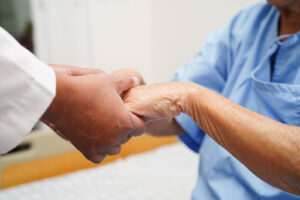Understanding How Skin Changes With Age

Skilled nursing care can help aging seniors protect their skin.
Our skin, the largest organ in the body, changes a great deal as we age. Understanding these changes and how they become even more prevalent with age is essential to maintaining good skin. The good news is that seniors don’t have to navigate their skin changes on their own. Both loved ones and skilled nursing services can help when needed, providing care, education, and more.
Recognizing Age-Related Skin Changes
The skin undergoes numerous structural and superficial changes as we age. Among the significant adjustments are:
- Reduced Elasticity: As elastin and collagen fibers lose their firmness and elasticity, sagging and wrinkles result.
- Skin Thinning: When the skin’s outermost layer, the epidermis, gets thinner, it becomes more vulnerable to damage and injury.
- Decreased Oil Production: As we age, our sebaceous glands produce less oil, which leaves our skin drier and more prone to irritation and breaking.
- Enhanced Susceptibility to Sun Damage: Extended periods of exposure to the sun over time can result in wrinkles, age spots, and a higher chance of developing skin cancer.
How Can Skilled Nursing Help?
While some of the changes noted above are inevitable, skilled nursing care can help seniors manage the changes in their skin. For instance, it can encourage seniors to stay hydrated, which can help prevent dry skin due to decreased oil production. Another significant way skilled nursing services help is with wound care.
As skin ages, there’s a higher chance of cuts, abrasions, and pressure ulcers. Skilled nursing professionals offer specific support and interventions that encourage healing and avert problems. Regarding wound care, here are a few of the ways skilled nursing helps:
- Evaluate Wounds: Skilled nursing can perform comprehensive evaluations of wounds, taking into account variables like size, depth, and the condition of the surrounding tissue.
- Apply Appropriate Dressings: To promote the best possible healing environment, they choose dressings that are suitable for the kind and extent of the wound.
- Handle Infections: Skilled nursing monitors wounds for signs of infection and treats them with antibiotics or other medications as needed.
- Educate: They instruct seniors and their loved ones on how to properly take care of wounds, including how to clean them, how to change their dressings, and how to recognize any problems.
- Collaboration: Skilled nursing can create personalized care plans that work in conjunction with doctors, therapists, and other healthcare providers.
Preserving Skin Health
Along with assistance from skilled nursing professionals, loved ones can also help seniors preserve skin health. For instance, they can encourage seniors to stay hydrated and remind them to wear sunscreen and a hat when spending time outdoors.
Seniors should also be mindful of the cleansers and moisturizers they use, avoiding products with harsh chemicals and abrasive exfoliants.
As seniors age, several skin changes occur. With the help of loved ones and skilled nursing services, they can navigate these changes and get the support they need when wounds become an issue. Seniors can take care of their skin and age gracefully with the support of a strong team by their side.
If you or an aging loved one are considering Skilled Nursing Services in Evanston, IL, contact the caring staff at Companion Services of America today at (847) 948-0860. Our home care service area includes Northbrook, Highland Park, Deerfield, Glenview, Buffalo Grove, Evanston, Des Plaines, Skokie, Lake Forest, Wilmette, and the surrounding areas.
Sources:
- https://medlineplus.gov/ency/article/004014.htm#:~:text=Aging%20skin%20looks%20thinner
- https://www.nia.nih.gov/health/skin-care/skin-care-and-aging
- https://www.webmd.com/beauty/cosmetic-procedures-aging-skin
- Supporting Senior Healing After Surgery - July 23, 2024
- Know the Warning Signs of UTIs - July 17, 2024
- How Senior Home Care from an Agency Helps Improve Safety for Aging Men and Women - July 10, 2024
